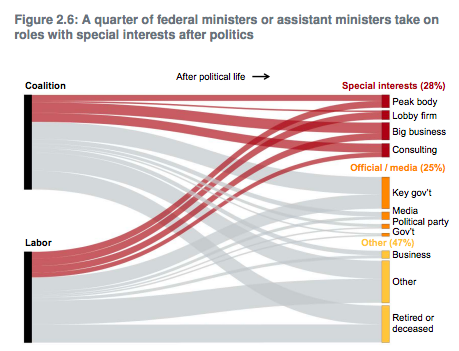
On July 7, 2016, the NSW government banned greyhound racing. A little over three months later, on Oct. 11, under crushing pressure from vested interests and some media outlets, it reversed that decision.
In the time that elapsed between the initial announcement and the humiliating about-face, the premier and deputy premier at the time, Mike Baird and Troy Grant, had six official meetings with greyhound racing groups trying to overturn the ban, but not one with the RSPCA or animal rights groups that supported the ban.
This information is contained in a new Grattan Institute report "Who's in the Room", which looks at the effect lobbying, access and political donations have on Australian politics.
Baird and Grant had two official meetings with greyhound reps after the ban announcement, and then Grant met with them again four times before the ban was overturned. The RSPCA didn't have a meeting with ministers until after the ban was overturned.
The Grattan Institute used as its source ministerial diaries, which are only made public in Queensland and NSW.
Report authors Danielle Wood and Kate Griffiths analysed who had more access to ministers in Queensland and New South Wales according to their diaries, and found that businesses in highly regulated industries such as transport, mining, energy, and construction had many more meetings with ministers than consumer groups, unions, and less-regulated businesses.

The industries that had more meetings with ministers also donated more, the institute found.

Wood told BuzzFeed News that highly regulated industries sought meetings, and to be involved in politics, because they're much more likely to be affected by government decisions.
She said it was likely the consumer and community category had fewer meetings with politicians because those groups didn't have the resources, organisational skills, or understanding of the process.
"I suspect part of the cause is they're just not asking as often, but it may well be the case they're less likely to get [meetings] as well."
The authors also looked at how many former ministers or assistant ministers since the 1990s have gone into lobbying roles after leaving politics and found that a quarter took up roles with lobby groups after leaving office.

Baird himself picked up a reported $2 million per year job as a NAB executive shortly after leaving politics.
Wood said there is still a lot of mystery over who has access to politicians, as well as the money donated to politics federally. The report recommends, in addition to publishing ministerial diaries, linking the already available lobbyist register with a register of who has an orange lobbyist pass, which allows free access through most areas of Parliament House.
BuzzFeed News has previously sought a copy of the log of orange pass use, but the Freedom of Information Act does not apply to the Department of Parliamentary Services.
The report also recommends capping the amount spent on political advertising, lowering the threshold for declarable donations down to $5,000, and the establishment of a federal anti-corruption body similar to the Independent Commission Against Corruption in New South Wales.
